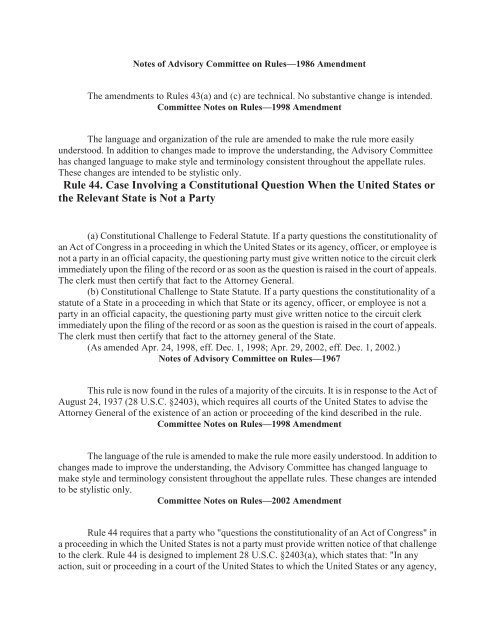Federal Rules of Appellate Procedure 2014-2015, 2014a
Federal Rules of Appellate Procedure 2014-2015, 2014a
Federal Rules of Appellate Procedure 2014-2015, 2014a
You also want an ePaper? Increase the reach of your titles
YUMPU automatically turns print PDFs into web optimized ePapers that Google loves.
Notes <strong>of</strong> Advisory Committee on <strong>Rules</strong>—1986 Amendment<br />
The amendments to <strong>Rules</strong> 43(a) and (c) are technical. No substantive change is intended.<br />
Committee Notes on <strong>Rules</strong>—1998 Amendment<br />
The language and organization <strong>of</strong> the rule are amended to make the rule more easily<br />
understood. In addition to changes made to improve the understanding, the Advisory Committee<br />
has changed language to make style and terminology consistent throughout the appellate rules.<br />
These changes are intended to be stylistic only.<br />
Rule 44. Case Involving a Constitutional Question When the United States or<br />
the Relevant State is Not a Party<br />
(a) Constitutional Challenge to <strong>Federal</strong> Statute. If a party questions the constitutionality <strong>of</strong><br />
an Act <strong>of</strong> Congress in a proceeding in which the United States or its agency, <strong>of</strong>ficer, or employee is<br />
not a party in an <strong>of</strong>ficial capacity, the questioning party must give written notice to the circuit clerk<br />
immediately upon the filing <strong>of</strong> the record or as soon as the question is raised in the court <strong>of</strong> appeals.<br />
The clerk must then certify that fact to the Attorney General.<br />
(b) Constitutional Challenge to State Statute. If a party questions the constitutionality <strong>of</strong> a<br />
statute <strong>of</strong> a State in a proceeding in which that State or its agency, <strong>of</strong>ficer, or employee is not a<br />
party in an <strong>of</strong>ficial capacity, the questioning party must give written notice to the circuit clerk<br />
immediately upon the filing <strong>of</strong> the record or as soon as the question is raised in the court <strong>of</strong> appeals.<br />
The clerk must then certify that fact to the attorney general <strong>of</strong> the State.<br />
(As amended Apr. 24, 1998, eff. Dec. 1, 1998; Apr. 29, 2002, eff. Dec. 1, 2002.)<br />
Notes <strong>of</strong> Advisory Committee on <strong>Rules</strong>—1967<br />
This rule is now found in the rules <strong>of</strong> a majority <strong>of</strong> the circuits. It is in response to the Act <strong>of</strong><br />
August 24, 1937 (28 U.S.C. §2403), which requires all courts <strong>of</strong> the United States to advise the<br />
Attorney General <strong>of</strong> the existence <strong>of</strong> an action or proceeding <strong>of</strong> the kind described in the rule.<br />
Committee Notes on <strong>Rules</strong>—1998 Amendment<br />
The language <strong>of</strong> the rule is amended to make the rule more easily understood. In addition to<br />
changes made to improve the understanding, the Advisory Committee has changed language to<br />
make style and terminology consistent throughout the appellate rules. These changes are intended<br />
to be stylistic only.<br />
Committee Notes on <strong>Rules</strong>—2002 Amendment<br />
Rule 44 requires that a party who "questions the constitutionality <strong>of</strong> an Act <strong>of</strong> Congress" in<br />
a proceeding in which the United States is not a party must provide written notice <strong>of</strong> that challenge<br />
to the clerk. Rule 44 is designed to implement 28 U.S.C. §2403(a), which states that: "In any<br />
action, suit or proceeding in a court <strong>of</strong> the United States to which the United States or any agency,


















